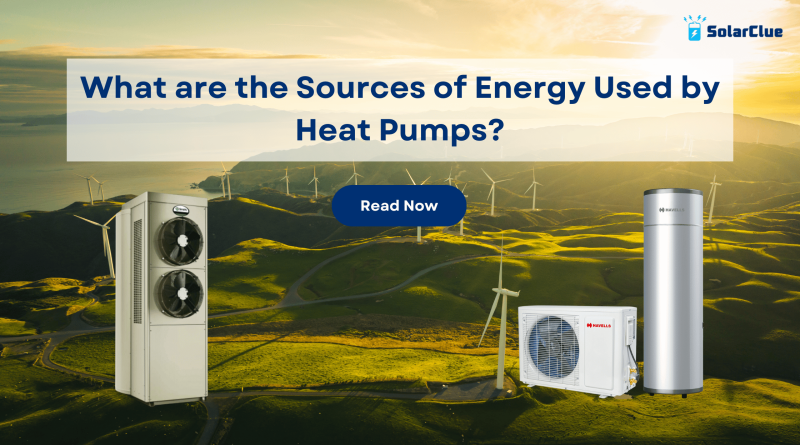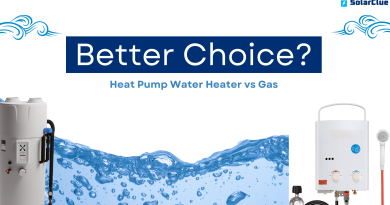What are the Sources of Energy Used by Heat Pumps?
Do you wonder how a heat pump can heat water so efficiently while using less electricity? What are the sources of energy used to operate efficiently? These systems use both renewable and non-renewable sources of energy.
In this blog, we will discuss about how heat pumps use the sources of energy to work so efficiently while consuming up to 75% less electricity than other water heaters like a geyser. But firstly, let’s understand what a heat pump is and how it works. Let’s get going!
Table of Contents
What is a heat pump?

A heat pump is a water heating device, to meet your daily hot water needs. It is energy-efficient, as it uses less electricity than other traditional water heaters. The difference lies in the working principle. Any traditional water heater, like a geyser, uses direct electricity to heat water. Whereas, a heat pump uses electricity to only transfer heat from one place to another. This heat is used to produce hot water, rather than electricity. A heat pump is one of the best sustainable ideas for the future.
How a heat pump system works?
A heat pump works on the principle of transferring heat from one place to another.
This system consists of two main components: an indoor unit and an outdoor unit.
The outdoor unit has two parts – an exhaust fan and a compressor. And the indoor unit is the storage tank, where water is stored.
The exhaust fan absorbs heat from the surrounding air, while the compressor compresses the refrigerant gas, increasing its temperature. This heated refrigerant gas then passes through a spiral condenser inside the indoor unit, transferring its heat to the water stored in the tank. This process continues until the desired water temperature is reached.
Unlike traditional geysers that use a significant amount of electricity to generate heat, heat pumps consume less energy by simply moving heat from one place to another. This makes them more energy-efficient and cost-effective in the long run.
What are the energy sources used by heat pumps to heat water?
Heat pumps harness energy from both renewable and non-renewable sources of energy to heat water. The primary energy source is the renewable energy which is the heat in the surrounding air. But it also requires electricity to absorb the heat and compress it. But the amount of electricity consumed is significantly lower than traditional water heaters like a geyser.
A renewable source of energy is a source that is naturally replenished and is essentially inexhaustible, such as solar, wind, geothermal, and hydropower. The advantages of renewable energy sources are numerous, including their positive environmental impact, reduced greenhouse gas emissions, and cost-effectiveness in the long run.
Are heat pumps as efficient as other water heaters?
Heat pumps are highly efficient when compared to other water heaters, such as a geyser. In fact, heat pumps can consume up to 75% less electricity than conventional water heaters while still providing the same level of hot water. This exceptional efficiency not only saves energy but also translates into significant cost savings over time.
There is another eco-friendly water heater option, which is a solar water heater. It does not use electricity at all. It absorbs sunlight, which is used to heat water. But it has a few disadvantages:
- Highly dependent on sunlight: On cloudy days, or lack of sunlight, solar water heaters will not be able to provide hot water. So in such situations, this system becomes inefficient.
- Takes time to heat water: A solar water heater requires 6 hours to heat water. It takes the entire morning to heat water. Heat pumps on the other hand requires only 3 hours to heat water.
- Fixed capacity: As a solar water heater requires sunlight, which is available only during day time, it can heat water only once a day. This process takes 6 hours. So it can provide only a fixed amount of hot water each day. On the other hand, a heat pump is a regenerative system. It can extract heat from surrounding even during night. It can continuously work.
Because of the above drawbacks of solar water heaters, a heat pump emerges as a more efficient option. But heat pumps have a high upfront cost. It costs almost double than a solar water heater. The choice is yours to make, which water heater you would like to install in your home.
Watch the video given below to make a better choice for your home:
What are the Benefits of Heat Pumps?
Heat pump water heaters offer numerous benefits. Let’s have a look at them:
1. Cost-Effective
Heat pumps have high upfront cost. However, they make up for it through lower operating costs. Heat pumps transfer heat rather than generating it directly. This uses far less electricity – up to 75% less. Over its 10-15 year lifespan, a heat pump can save you hundreds or even thousands in energy costs. So it is actually a cheaper alternative to other traditional water heaters like geysers.
2. Long Lifespan
With proper maintenance, heat pumps last 15 years or more – significantly longer than standard electric geysers (8-10 years). So there is no need for replacement for a long time. This extended life cycle also contributes to it being a cost-effective option.
3. Reduced Water Wastage
Traditional water heaters constantly heat and reheat the same water, leading to significant energy losses. Heat pumps heat water more efficiently, so you don’t have to run the tap as long waiting for hot water. This conserves water, especially in households with long pipe runs.
4. Efficient in Cold Climates
One common misconception about heat pump water heaters is that they may not perform well in colder climates. However, modern heat pump water heaters are designed to be efficient even in low temperatures. They can effectively extract heat from the surrounding air, even when the temperature drops below freezing. This makes heat pump water heaters a viable and energy-efficient option for hot water needs in various climates, including colder regions.
5. Manual Temperature Setting
Most heat pumps allow you to change temperature as per your requirements. This ensures you have hot water when needed without wasting energy by overheating the water beyond your requirements.
6. Availability in Different Sizes
Heat Pumps normally have an indoor and an outdoor unit. But many homes in India, specially in big cities, may not have that space available. For that, a single-unit heat hump is designed. It is also called Integrated Heat Pump.
Conclusion
Heat pump technology is the future of water heating solutions in India. It is cost-effective and energy-efficient. This system is a sustainable choice. It is now time for India to invest in heat pumps for a better future.
Visit SolarClue® to see the best heat pump water heaters. SolarClue® is an online marketplace where solar energy products are sold at discounts up to 50%.




